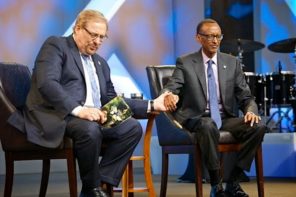[A]s a pastor, my goal is to, to encourage, to support. I never take sides.
—Rick Warren on Meet the Press, Nov. 29, 2009
Uganda is currently contemplating anti-gay legislation so extreme that some of the most homophobic figures on the American religious right have criticized it. Homosexual activity is already illegal in Uganda, but under the new law “repeat offenders” and those having sex with HIV-positive individuals could be sentenced to death; citizens would be required to inform on those they suspect of homosexuality, or face imprisonment themselves.
“Christian ministries are speaking out against a Ugandan bill that would levy harsh penalties for homosexuals, saying it will make Christian ministry to homosexuals impossible,” began a recent article in the conservative evangelical World Magazine. Even Scott Lively, activist and author of The Pink Swastika, which compares homosexuality to Nazism, is quoted saying he wants Uganda to liberalize the measure.
This is all very salutary—anyone who wants to join a coalition against this abominable measure should be welcomed. But as a timely new report from the think tank Political Research Associates makes clear, the American religious right can’t evade responsibility for the homophobic mania that’s seized several African countries. Anti-gay activists in the United States may think the Uganda measure goes too far, but they laid the groundwork for it.
PRA’s report, “Globalizing the Culture Wars: U.S. Conservatives, African Churches, & Homophobia,” fills an important void in our understanding of the religious right’s transnational activities. Lead writer Kapya Kaoma, himself an Anglican priest from Zambia, shows how the American right has recruited African proxies to aid in their domestic anti-gay activism, in the process turning African sexual minorities into “a kind of ‘collateral damage’ in the US culture wars.” [Read RD’s interview with Kapya Kaoma, “The Anti-Gay Highway.”]
It’s no secret, of course, that there are strong and growing links between American and African conservatives. Rick Warren has been deeply involved in planting churches in Africa and mentoring African preachers. Breakaway factions of American mainline denominations, objecting to the ordination of gay priests and the sanctioning of gay unions, have put themselves under the authority of conservative African clerics. Few can forget the spectacle of Sarah Palin’s anointing at the hands of Thomas Muthee, a Kenyan Pentecostal and witch-hunter who has boasted of driving a woman with evil powers from her Nairobi suburb.
Meanwhile, African leaders—including many politicians—have adopted some of the American right’s most viciously homophobic rhetoric. And Uganda isn’t the first African country to step up persecution of gay people. “Since the late 1990s, the Anglican archbishops of Uganda, Kenya, and Nigeria, and presidents Yoweri Museveni of Uganda, Robert Mugabe of Zimbabwe, and Sam Nujoma of Namibia have all used homosexuality to distract people from the issues facing their countries and churches by claiming that homosexuals are responsible for moral decay in Africa,” writes Kaoma. Earlier this year, Burundi made homosexuality a criminal offense punishable by up to two years in prison.
Even though many are aware of these trends, Political Research Associates is among the first to investigate them in a systematic way, and to provide a coherent narrative to help us understand what’s happening. No organization in the United States studies the religious right with as much rigor and depth as Political Research Associates (full disclosure—I’ve consulted for them in the past). Kaoma’s report is particularly interesting in noting the financial incentives for African preachers to foreground homophobia:
Funding from conservatives is highly personal—only bishops with US connections receive it—and unrestricted, unlike that of mainline churches, which demand strict accountability from African churches for all the money they receive.
Under the Bush administration, anti-gay religious organizations in Africa were further fortified with funds from PEPFAR, the United States’ AIDS program.
There is, of course, a fundamental irony in these arrangements. American conservatives have convinced their African peers that collaborating with them somehow represents a kind of anti-colonial resistance. One is almost tempted to applaud the American right’s audacity. After all, it generally opposed Africa’s national liberation movements, and often smeared the progressive churches that supported them. Now, by presenting homosexuality as the corrupt imposition of a decadent, dying West, American Christian conservatives have positioned themselves as champions of the developing world’s cultural authenticity. Meanwhile, African leaders purport to fight Americanization by aligning with some of the most powerful and chauvinistic of American religious leaders, and even taking US government money.
“When it comes to homosexuality… many African religious leaders view progressive social witness on LGBT equality as a ‘Western agenda,’” writes Kaoma. “In many respects, their denunciation of homosexuality is an attack on the West rather than a statement about human sexuality.” That’s one reason the anti-gay rhetoric prevalent in Africa often resembles modern European anti-Semitism: gay people, like Jews, are seen as subversive, foreign, and enervating, threatening the nation’s unity and virility.
Africans didn’t import their antipathy to homosexuality; indeed, one serious lacuna in the PRA report is that it largely ignores the influence of conservative Islam on the persecution of gay people on the continent. In Nigeria, gay people have been sentenced to death under Sharia, while in Muslim Senegal, gay sex is punishable by lengthy jail sentences. To ignore this altogether—particularly in a report that repeatedly criticizes the Christian right’s promotion of “Islamophobia”—seems like an unfortunate PC dodge.
Still, even if homophobia does have deep roots in Africa, the notion that gay people constitute an international conspiracy with a malevolent agenda is very much a product of the American religious right. There’s a clear connection between the domestic Christian right’s demonization of gay people and the emergence of similar themes among the movement’s allies abroad. Just as the Protocols of the Elders of Zion is a fundamentally European fiction, despite having been embraced by many Muslims, the homophobic narratives common among Christian leaders in Africa trace back to the United States.
Like anti-Semitism, homophobia can’t necessarily be controlled by those who unleash it. Scott Lively, for example, might balk at instituting the death penalty for homosexuality, but Uganda is only taking his work to its logical conclusion. Lively, after all, has claimed, in his book The Poisoned Stream, that “a dark and powerful homosexual presence” can be traced through “the Spanish Inquisition, the French ‘Reign of Terror,’ the era of South African apartheid, and the two centuries of American slavery.” Surely, strong measures are necessary to combat something so sinister!
In March, Lively, along with Don Schmierer and the Ugandan anti-gay activist Stephen Langa, held a “Seminar on Exposing the Homosexual Agenda” in Uganda’s capital. PRA’s website contains video and text excerpts from the event. “The gay movement is an evil institution that’s goal is to defeat the marriage-based society and replace it with a culture of sexual promiscuity in which there’s no restrictions on sexual conduct except the principle of mutual choice,” Lively says at one point. Later, he says, “Nobody has been able to stop them so far. I’m hoping Uganda can.”
According to Kaoma, Lively and Schmierer were “later able to meet with Ugandan parliament members and other politicians, and received access to state media to promote their views.”
Still, neither Lively nor Schmierer has anything approaching the influence of Rick Warren, a close friend of Ugandan first lady Janet Museveni. Warren, the PRA report says, “positions himself as a moderate on gay issues in the U.S. but declared in Africa in 2008 that, ‘Homosexuality is not a natural way of life and thus not a human right.’ That same year he christened Uganda a ‘purpose driven country.’” (Though the report doesn’t mention it, Warren is also a patron to Martin Ssempa, one of Uganda’s leading anti-gay pastors.)
Unlike other religious right figures, Warren has yet to come out publicly against Uganda’s laws, even though, given his profile in that country, a statement by him could make a real difference. His neutrality is profoundly telling. “With the criminalization of homosexuality looming in Uganda and other African states, there is a need to start exposing US religious leaders such as Warren to an American audience,” writes Kaoma. His report is a start.




